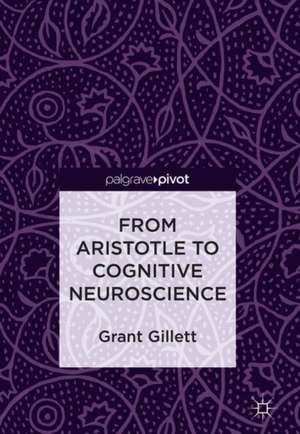From Aristotle to Cognitive Neuroscience
Autor Grant Gilletten Limba Engleză Hardback – 29 noi 2018
In a fascinating account, the author integrates the history of philosophy of mind and phenomenology with recent discoveries on the neuroscience of conscious states. The reader can trace the development of a neuro-philosophical synthesis through the work of Aristotle, Kant, Wittgenstein, Husserl, Merleau-Ponty, Brentano and Hughlings-Jackson, among others, and so explore contemporary philosophical puzzles surrounding consciousness and its relation to cerebral synchrony and connectedness.
Of interest to students and scholars of neuroethics, neurophilosophy and philosophy of mind, as well as philosophy of psychiatry, From Aristotle to Neuroscience demonstrates the real essence of consciousness as it increasingly connects with philosophy, law, morality, aesthetics, and spirituality.
Preț: 455.51 lei
Nou
Puncte Express: 683
Preț estimativ în valută:
87.16€ • 91.00$ • 72.14£
87.16€ • 91.00$ • 72.14£
Carte tipărită la comandă
Livrare economică 05-19 aprilie
Preluare comenzi: 021 569.72.76
Specificații
ISBN-13: 9783319936345
ISBN-10: 3319936344
Pagini: 166
Ilustrații: IX, 166 p. 3 illus., 2 illus. in color.
Dimensiuni: 148 x 210 mm
Greutate: 0.44 kg
Ediția:1st ed. 2018
Editura: Springer International Publishing
Colecția Palgrave Pivot
Locul publicării:Cham, Switzerland
ISBN-10: 3319936344
Pagini: 166
Ilustrații: IX, 166 p. 3 illus., 2 illus. in color.
Dimensiuni: 148 x 210 mm
Greutate: 0.44 kg
Ediția:1st ed. 2018
Editura: Springer International Publishing
Colecția Palgrave Pivot
Locul publicării:Cham, Switzerland
Cuprins
Chapter 1. Introduction: Second nature and the human soul.- Chapter 2. From Aristotle to consciousness and intentionality.- Chapter 3. Evolutionary neurology and integrative self-formation.- Chapter 4. Diverse dissolutions of the integrated human self.- Chapter 5. Consciousness, value and human nature.- Chapter 6. Second nature, the will, and human neuroscience.- Chapter 7. Consciousness: Metaphysical speculations and supposed distinctions.- Index.
Notă biografică
Grant Gillett is Professor of Biomedical Ethics at the University of Otago, New Zealand. He received his personal chair in Biomedical Ethics in 1995, and is active in biomedical ethics and neuroethics both nationally and internationally. He is the author of more than 350 articles spanning issues in post-modern philosophy, the philosophy of mind and language, medical ethics, philosophy of medicine, philosophical psychology, and philosophy and psychiatry. He has also authored six books including The Mind and its Discontents (Oxford University Press).
Textul de pe ultima copertă
From Aristotle to Cognitive Neuroscience identifies the strong philosophical tradition that runs from Aristotle, through phenomenology, to the current analytical philosophy of mind and consciousness.
In a fascinating account, the author integrates the history of philosophy of mind and phenomenology with recent discoveries on the neuroscience of conscious states. The reader can trace the development of a neuro-philosophical synthesis through the work of Aristotle, Kant, Wittgenstein, Husserl, Merleau-Ponty, Brentano and Hughlings-Jackson, among others, and so explore contemporary philosophical puzzles surrounding consciousness and its relation to cerebral synchrony and connectedness.
Of interest to students and scholars of neuroethics, neurophilosophy and philosophy of mind, as well as philosophy of psychiatry, From Aristotle to Neuroscience demonstrates the real essence of consciousness as it increasingly connects with philosophy, law, morality, aesthetics, and spirituality.
In a fascinating account, the author integrates the history of philosophy of mind and phenomenology with recent discoveries on the neuroscience of conscious states. The reader can trace the development of a neuro-philosophical synthesis through the work of Aristotle, Kant, Wittgenstein, Husserl, Merleau-Ponty, Brentano and Hughlings-Jackson, among others, and so explore contemporary philosophical puzzles surrounding consciousness and its relation to cerebral synchrony and connectedness.
Of interest to students and scholars of neuroethics, neurophilosophy and philosophy of mind, as well as philosophy of psychiatry, From Aristotle to Neuroscience demonstrates the real essence of consciousness as it increasingly connects with philosophy, law, morality, aesthetics, and spirituality.
Caracteristici
Provides an up-to-date survey of thinking in cognitive neuroscience, the neurophilosophy of human consciousness and neuroethics Links current themes in the area to their historical origins and forebears, making connections between phenomenology, embodied cognition, philosophy of mind, and neuro-science Explores applications for the neurophilosophical analysis for aesthetics and ethics, and so taps into topical and popular trends in scholarship
